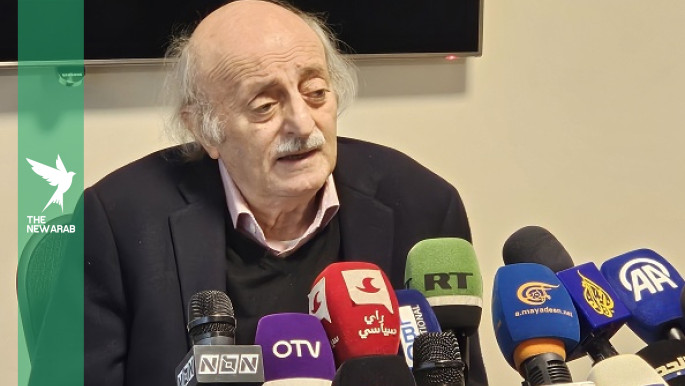Leading Lebanese Druze politician Walid Jumblatt stressed that the Druze-majority province of Suweida was an “integral part” of Syria, following separatist sentiments that had emerged after sectarian clashes in the province earlier this year.
In an interview with Syria’s state-run Al-Ikhbariya channel on Friday, Jumblatt said that a formula had “to be found” in which the people of Suweida could “come to an agreement with the Syrian government”.
He stressed that those responsible for the deadly July clashes “must be brought to justice” to rebuild trust with President Ahmed al-Sharaa’s government.
He said that they were awaiting the results of the investigations, and added that the word “mistakes” was “too weak” to describe what had happened in Suweida, as crimes had been committed by all sides.
In the interview, Jumblatt addressed recent developments in Suweida following months of sectarian tensions in the governorate.
In July, clashes had erupted between armed Druze and Bedouin groups in Suweida and nearby villages, killing hundreds of people.
The Syrian government’s armed forces had intervened, and rights groups accused them of taking part in the fighting. Reports cited summary executions, abuse of civilians, and kidnappings, while the violence triggered the displacement of around 200,000 people from the area.
Jumblatt said that the Bedouin tribes living in Suweida should not be forced to flee the Druze-majority region, and rejected any practices that “would undermine Syria’s social fabric”
He added that “the Druze position is not unified” as a result of the unrest, noting that Israel’s involvement “on behalf” of the religious minority had been seen as an attempt to exploit tensions in pursuit of its “Greater Israel” agenda.
“There are sharp disagreements regarding Israeli intervention and the unity of Syria, but I am not alone; there is a segment of Arab nationalists and patriots with us,” he told Al-Ikhbariya.
Jumblatt also criticised Hikmat al-Hijri, the spiritual leader of Suweida’s Druze community, who had voiced opposition to the Syrian transitional government and had publicly praised Israel “for saving” his community during the clashes.
He condemned al-Hijri’s reference to Jabal al-Druze – the mountain where most of Syria’s Druze population lives – as “Jabal al-Bashan”, the Hebrew Bible name for the region, calling it a “distortion of history and national identity”.
In discussing Syria’s political future following the fall of Bashar al-Assad’s regime, Jumblatt said that “President al-Sharaa, his aides, and his foreign minister had to work diplomatically to preserve a unified Syria,” adding that “it was not possible to return to the old centralised rule”.
“The Syrian government must leverage the network of relationships it has built with Turkey, Saudi Arabia, and Qatar to confront the historic Zionist project that seeks to fragment the region in order to control it,” he added.
As for Syrian-Lebanese relations, Jumblatt called for “more normal” ties between the two countries, where tense relations have festered due to Syria’s occupation of Lebanon, the spillover of the Syrian civil war, the mistreatment of Syrian refugees in Lebanon and the more recent border clashes.
Jumblatt said the vestiges of the Assad regime still remain in Lebanon, stating it was “imperative to get rid of these people”, as they “pose a threat” to Lebanese and Syrian security.
During the July violence, Jumblatt voiced his support for a political solution within the framework of the Syrian government and rejected any external intervention in the crisis.
He also urged Suweida’s integration within the country and stressed “preserving Syria’s unity and promoting understanding among all its citizens under the authority of the Syrian state”.

